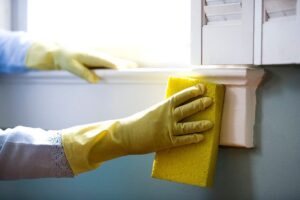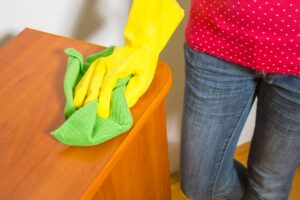Why Every Homeowner Needs Residential Cleaning Services – What to Know
There’s no doubt that you have the capacity to clean your house by yourself. But sometimes, due to other responsibilities, you may not have the time to render your place spotless. As a homeowner, you would want to come home to a house that is clean, fresh, and free of mess, but that may not be the case if you can’t expend any more time and energy scrubbing every nook and cranny of your space.
If this sounds like you, you may benefit from hiring professional cleaners. That way, the burden is off your shoulders as you’re delegating the task to professionals who are adept at cleaning homes. You won’t have to spend time dusting, washing, or vacuuming—everything is taken care of for you, so you can focus on more important matters
You get to have more free time.
Since you no longer have to spend a huge chunk of your time making sure that every room in your home is spotless, you get to spend more quality time with your friends and family or on your hobbies. The residential cleaning service professionals will get the job done, delivering sparkling surfaces and making sure that even the most hard-to-reach areas in your house are free of dirt and dust. Since you’re handing over the job to experts, you know that your house is in the right hands. You’ll be less stressed about the outcome as they know how to tackle your home in a way that you would appreciate.
You’ll have a cleaner and safer environment.
Hiring professional house cleaners is more than just having someone come over and dust off rooms and arrange your furniture. It’s also about making sure that your home is thoroughly clean inside and out and top to bottom, eliminating the germs and bacteria circulating inside. As a result, you and your family get to breathe cleaner, healthier air.
You get to save money on cleaning supplies.
If you’re in charge of cleaning your home, there are certain things that you need to buy, like cleaning agents and pricey cleaning tools. When you opt for recurring house cleaning services, you no longer have to keep buying these materials as the cleaners are already equipped with everything they need to make your house spotless.

House Cleaning Tips to Help You Prevent the Spread of COVID-19 – Our Guide
With growing national concern about the COVID-19 pandemic, homeowners are trying to find more ways to keep their homes safe and free from the virus. While there is no vaccine currently available or any way to permanently make your home impervious to the disease, you can slow its spread by following the advice of experts
The Centers for Disease Control and Prevention maintains that, aside from social distancing measures, hygiene helps in preventing the spread of the coronavirus. Frequent and proper handwashing, refraining from touching the eyes, nose, and mouth, and boosting the immune system are all ways to help your body combat the virus.
Beyond your own personal cleanliness, you must also regularly disinfect your home. Some homes have a set cleaning schedule, and for these homes, they may just incorporate preventive steps into the routines that are already established. For homes with no set schedules, this article discusses some things you should know about when cleaning and disinfecting your house against COVID-19.
Note the difference between cleaning and disinfecting
Cleaning is not the same as disinfecting. When you clean a surface, you are merely removing visible dirt, grease, or grime from it. This can be achieved just by wiping a surface with a dry rag. For stubborn stains, you may need to use a wet cloth or soap. Meanwhile, disinfecting is the use of stronger cleaning materials such as aerosols and bleach. The goal of disinfecting is not just to keep a space visibly spotless; it is also for eradicating harmful microorganisms
Start a daily house cleaning schedule
Every day, you should set aside a few minutes to an hour for cleaning. If you have responsibilities, like working from home or needing to leave the house as an essential worker, you can ask your other household members to take this task on. Cleaning your home every day is a necessity, especially during a pandemic.

Hiring a house cleaner for the first time? Your etiquette questions, answered
a room-by-room guide for spring cleaning your apartment top to bottom, but if that seems too daunting—or if you’d rather just throw money at the problem—there are countless services for hire that’ll happily come in and do your dirty work. However, if you’ve never turned to a cleaning service before, the process can be fraught with etiquette issues.
Should I tip my house cleaner, and how much?
who adds that it’s more common practice if you’re hiring an individual cleaner. “Keep in mind that it’s always your decision,” he says.
Should I pre-clean or do any prep work before your house cleaner arrives?
There’s a reason the phrase “cleaning up for the maid” exists: Depending on what kind of cleaning you want done (and how much time you’re willing to pay for), it can be helpful to clear up clutter ahead of time so a cleaning service can focus on a thorough sweep. “Try to corral that first layer of clutter, otherwise it will take your cleaners twice as long,”
What should I look for in a cleaning service?
Naturally, you’re going to want a trustworthy company with a proven track record. And while online reviews are a solid place to start if you want a sense of the company’s history, this is one industry where word of mouth is still king. “Turn to your friends on social media,”
Can I be home while someone cleans my apartment? What about my pets?
This varies from company to company, so again, read the fine print before you book. “Some services require clients to be there the entire time, some not,”

COLLECTION HOUSEKEEPING GUIDE
A well-designed housekeeping plan serves more than one function. It not only keeps collections clean and dust-free, but also allows staff time to regularly monitor the state of the collection. Housekeeping can also serve as a low-budget way to support other collections care activities, such as pest management.
DEVELOPING A COLLECTIONS MAINTENANCE PROGRAM
Housekeeping tasks will vary depending upon the size, use, and type of collection; a historic house has different needs than a contemporary art museum. A regular schedule of daily, weekly, monthly, and semi-annual to annual tasks ensures that the entire collection receives attention and care. It is just as important to make sure that a collection is not over-cleaned as it is to make sure that it is cleaned, which is why a housekeeping log is an important part of a collections maintenance program.
The Housekeeping Log
A housekeeping log is a great way to keep track of what has been done and what has yet to be done, and any changes in the status of a collection can be recorded. The log should be updated upon completion of any housekeeping tasks. If the collection also has a pest log, the two can support one another. Although the format can vary, a housekeeping log should include the following: task, date, notes, and staff member name.
HOUSEKEEPING SUPPLIES
Magnetic dusting cloths—for example, Dust Bunny Cloths—are chemical-free and use electrostatic charge to attract dust. Do not use feather dusters or cloths impregnated with chemicals or cleansers, as these can potentially leave a damaging residue behind. 100% cotton, chemical-free rags (clean diaper cloths) may also be used.
Soft, natural hair artist brushes, for dusting small or fragile areas (note: brushes used for dusting collections should only be used for this purpose)
Cheesecloth or muslin for use as a filter to vacuum very fragile or flaking items (should be washed prior to use)
Vacuum for collections care
Gentle disinfectant, such as Lysol
Dust mops
Dust masks
Nitrile gloves
Distilled water
Ammonia (note: should not be used near metals or on unstable glass)
Isopropyl Alcohol
Orvus cleaning solution
Murphy’s Oil soap (for mopping floors)
Renaissance Wax or Butcher’s Wax
HOUSEKEEPING PROCEDURES
The following are general guidelines. For very delicate or fragile objects, always consult a conservator before proceeding with any cleaning regimen.
Books
Bindings and text block edges can be cleaned with a cloth or vacuum. If the spine or boards of a book are loose or detached, avoid any cleaning procedures until they have been stabilized. If the binding is in stable condition and the text block is only lightly soiled, magnetic cloths are appropriate. If a book is very dusty or dirty (or if a book has deckled edges), it is preferable to use a vacuum to avoid pushing dirt into paper fibers or damaging delicate edges. Use a soft natural brush or brush attachment on the vacuum, and a micro-tool attachment meant for small areas. Low suction is preferable.
Step-by-step exterior house cleaning guide
Get your outside areas in tip top shape. Experts share their step-by-step tips for tidying up your decking, pavers, brickwork and guttering.
Spring has arrived and now is the perfect time to roll up your sleeves and take on those irksome house cleaning jobs that you’ve been ignoring for months. Now that the weather is warming up, it’s safe to venture outside and get stuck in to outside areas.
some tips for cleaning a timber deck:
Sweep away dust, cobwebs and leaves
With a softwood deck, scrub surface with a hard-bristled brush and a mild detergent solution to remove embedded dirt, grease and grime. If your deck is made from hardwood (iron bark, merbau or blackbutt) it’s safe to wash with a high-pressure cleaner.
Rinse with water.
Once the deck is dry, apply two or three coats of your preferred timber coating. If decking is peeling, flaking or mouldy, you’ll need to strip it back and sand the surface before recoating.
For stubborn stains, apply an oxalic acid-based cleaner such as Sikkens Cetol BL Deck and Wood Cleaner; leave for 15 minutes and wash away.
For an even finish, apply timber coating with a soft, pure-bristle brush, such as a Sikkens Ezee Deck Brush.
national landscape buyer, Bunnings, shares his tips on how to tidy up pavers.
Be careful not to remove the jointing sand from new pavers. Don’t use vacuum sweepers or water for three months after installation.
Spread a coarse sand over pavers.
Dampen sand with a hose.
With a stiff-bristled broom, sweep sand over pavers and repeat. Hose off excess sand.
For tough stains, clean with a chemical or acid wash (check your manufacturer’s instructions first) and a stiff brush or high-pressure cleaner.
For quick, effective cleaning, try Kärcher’s K3.190 T250 1.6W High Pressure Cleaner and Diggers Rust & Stain Cleaner, both from Bunnings.
his advice on tidying up brickwork.
Use a cobweb brush to remove cobwebs and loose dirt.
Fill the tank of a pressure washer with exterior house-washing detergent. Set the washer head to ‘spray’ so the detergent mixes with the water. Then, set washer head to ‘fan’ and clean brickwork, running the water evenly across the surface.
For stubborn stains, change to the ‘roto’ nozzle setting and focus the pressure cleaner on the stain.
To finish, use a fixed or rotary brush and concentrated detergent to scrub away any stubborn marks by hand.
Must-have equipment includes AR Blue Clean Exterior House Wash and AR Blue Clean Pressure Washer Rotary Brush

Recent Comments